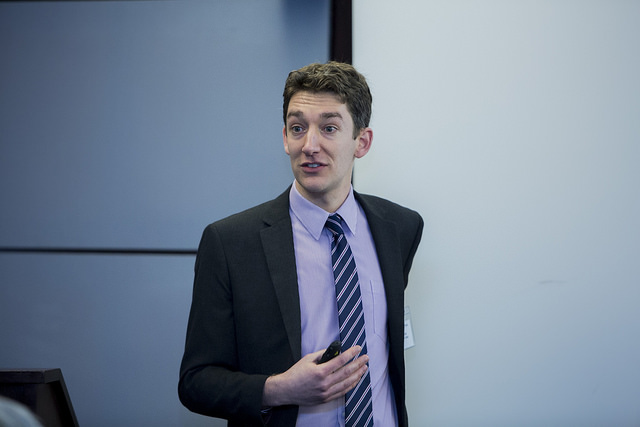
Image Credit: The Institute of Physics
Let’s face it. The world is filled with a lot of people who are not very good speakers. We have a chance to hear these people speak all the time. Since we have become at least comfortable with speaking if not pretty good at it, what all of this means is that because of the importance of public speaking we now have an obligation. As accomplished speakers, it is our job to help those who have not yet reached our level of speaking to improve. How can we go about doing this? Simple – by mentoring.
Mentoring Is About Some Of The Answers
So what is this mentoring thing all about? Mentoring is something that us speakers grow into. There comes a time in our speaking journey that we realize that we have the skills that we can use to help others become better speakers. When this happens, we are ready to become a mentor.
When you are a mentor, the good news is that you don’t actually have to have all of the answers to the questions that a speaker may ask you. Rather, what you job is going to be is to change the way that they think. What you are going to want to do is to get the person that you are mentoring to start to think about what they should be doing when they are speaking. You want to become that voice in their head. The best speaker mentors are the ones who really don’t say all that much; however, they are able to provide a sense of conscience that will impact the person that they are mentoring.
Mentoring Is About Asking Questions
The person that you are going to be mentoring has been talking for a while. What this means is that they have already formed their own ideas about their skills and how their speeches are being perceived that it can be difficult to get them to change their mind. They no longer have any chance of being able to gain a rational perspective of how they talk. This is where you can come in. What you are going to want to do is to sit down with them and ask some considered questions. The goal is to find a way to get them out of their cocoon and get them to see how they are speaking. If you can do this correctly, then you can get the person that you are mentoring to see their speaking in a brand new light.
You Don’t Want To Over-Mentor
Being willing to give advice to a speaker who needs it is a good thing. However, you do need to be careful. In some cases, speakers end up collecting a stable of people who are willing to help them. When they do this, they know that they can turn to them in order to get guidance about any issues that may pop up as they are preparing to deliver a speech. The reason that this is a bad thing is because it allows the person that you are mentoring to get out of having to think for themselves.
When you agree to mentor a speaker, you need to determine if anyone else has also agreed to mentor them. As a mentor, you need to make sure that you are not too easy to get in touch with. You want them to develop the ability to think for themselves and talk with you about it later on.
Advice Is To Be Freely Given
Anything that a speaker that you have agreed to mentor may be going through is probably something that you have gone through at some point in your own speaking journey. What this means is that you can provide them with advice on how to deal with things drawn from your own personal experiences. What you are going to want to do is to share your stories with the person that you are mentoring. Let them know that you’ve been there and that you made it through. This will help to build a real bond between you and the person that you are mentoring.
Remember That Mentoring Is Different From Managing
A small but important point that you are going to have to remember when you agree to mentor somebody is that there is a distinct difference between mentoring someone and managing them. As a mentor, your goal is going to be to find a way to create a relationship with the person that you are mentoring that will be based on independence. When you get together, you want there to be objectivity at play. You don’t want the person that you are mentoring to be sitting around waiting for you to tell them what to do next. You don’t want to just provide the person that you are mentoring with positive reinforcement – make them challenge themselves in order to become better.
What All Of This Means For You
As speakers, it turns out that we have some responsibilities. When we reach a certain stage in our speaker journey, it becomes time for us to offer our speaking skills to other speakers in order to allow them to become better and share the benefits of public speaking. This is when we can become a mentor to other speakers. The trick is that we need to figure out how to be an effective mentor.
The good news about being a mentor is that we don’t have to have answers to all of the questions that the person that we’ll be mentoring will be asking. Instead, our job is to act as a conscience that they’ll think about as they are giving their next speech. In order to help the person that we are mentoring improve, we need to be sure to ask the right questions. We need to draw them out of theirselves and get them to look at how they are delivering speeches in a new way. Everything that the person that you are mentoring is going through is something that undoubtedly you have gone through. Don’t be afraid to share your stories with them. It will help the two of you to bond. Keep in mind that you are mentoring, not managing this speaker. That means that you want to be objective and not allow them to come to rely on you too much.
What’s interesting about becoming a mentor to another speaker is that this undertaking actually comes with two benefits. The first, of course, is that you’ll be able to help another speaker improve their speaking style quicker than they would be able to do it by themselves. The other is that you will actually become a better speaker also. As a mentor, you’ll be reminded of all of the things that a good speaker has to remember and you’ll apply these to your next speech. It sure looks like everyone wins when you agree to be a mentor.
– Dr. Jim Anderson
Blue Elephant Consulting –
Your Source For Real World Public Speaking Skills™
Question For You: Do you think that it is possible to mentor multiple people at the same time?
![]() Click here to get automatic updates when The Accidental Communicator Blog is updated.
Click here to get automatic updates when The Accidental Communicator Blog is updated.
P.S.: Free subscriptions to The Accidental Communicator Newsletter are now available. Subscribe now: Click Here!
Note: What we talked about are advanced speaking skills. If you are just starting out I highly recommend joining Toastmasters in order to get the benefits of public speaking. Look for a Toastmasters club to join in your home town by visiting the web site www.Toastmasters.org. Toastmasters is dedicated to helping their members to understand the importance of public speaking by developing listening skills and getting presentation tips. Toastmasters is how I got started speaking and it can help you also!
What We’ll Be Talking About Next Time
Nobody ever said that giving a speech was going to be something that would be easy to do, but sometimes it sure seems like it is a lot harder than it should be. What makes creating a speech so hard to do is what we want the speech to do for us: we want to be able to reach out, make a connection with our audience, and then share with them the valuable information that we have for them using the importance of public speaking. Getting a single speech to do all of these things can be quite a challenge. What is the best way to create a speech that will work for us?

